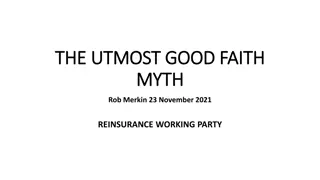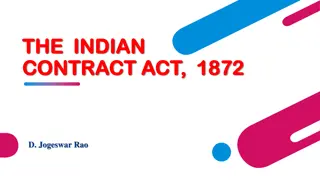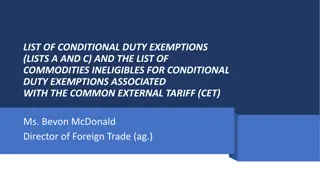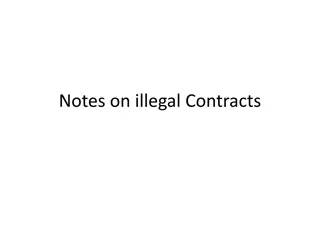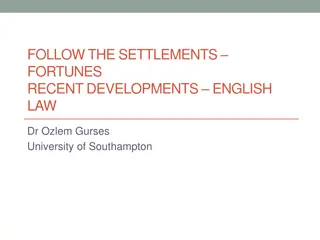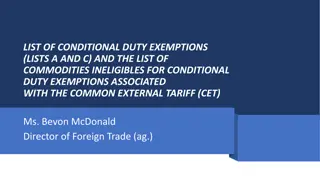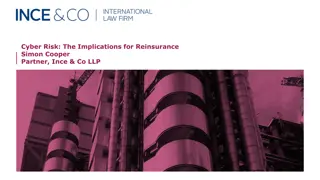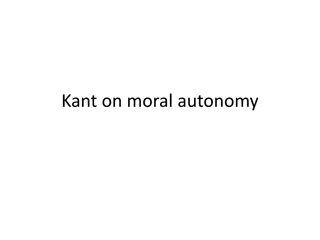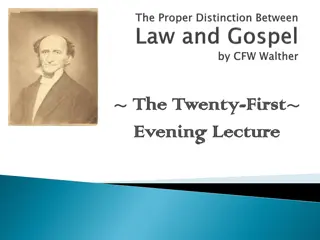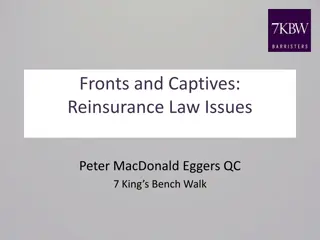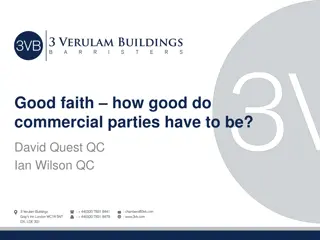The Continuing Duty of Good Faith in Reinsurance Contracts: English Law Perspective
English contract law's view on good faith in reinsurance contracts is analyzed. While no general doctrine of good faith exists in English law, exceptions like the duty of good faith in negotiating and performing contracts as seen in other legal systems are explored. The historical background and rationale behind the duty of good faith, particularly in marine insurance contracts, are discussed, along with the impact of the Insurance Act 2015 on the duty of utmost good faith in marine insurance.
Download Presentation

Please find below an Image/Link to download the presentation.
The content on the website is provided AS IS for your information and personal use only. It may not be sold, licensed, or shared on other websites without obtaining consent from the author.If you encounter any issues during the download, it is possible that the publisher has removed the file from their server.
You are allowed to download the files provided on this website for personal or commercial use, subject to the condition that they are used lawfully. All files are the property of their respective owners.
The content on the website is provided AS IS for your information and personal use only. It may not be sold, licensed, or shared on other websites without obtaining consent from the author.
E N D
Presentation Transcript
The continuing duty of good faith in reinsurance contracts The English law perspective Dr Franziska Arnold-Dwyer 13 September 2021 2
Good faith and general contract law English contract law does not recognize the existence of a general doctrine of good faith commercial parties should be allowed to pursue their own self-interest Scope of GF is too open-ended and uncertain legal certainty is paramount in commercial contract GF requires enquiry into state of mind of contract parties GF impinges on freedom of contract and autonomy of parties Compare: French Civil Code, art. 1104 (duty of good faith in negotiating and performing contracts); German BGB 242 and US Uniform Commercial Code 1- 204 (duty of good faith in performing contracts) Professor nan s talk No obligation to negotiate in good faith (Walford v Miles [1992] 2 AC 128) No general duty of pre-contractual disclosure caveat emptor (let the buyer beware) principle applies, but general law on misrepresentation Traditionally no duty to perform contract in good faith but developing case law 3
Good faith Rationale of duty of good faith: Full information exchange relating to the risk To prevent fraud and encourage good faith in mutual dealings Historical background: support a fledgling insurance industry Carter v Boehm (1766) 3 Burr 1905; Pan Atlantic Insurance Co Ltd v Pine Top Insurance Co Ltd [1995] 1 AC 501 Marine Insurance Act 1906 (Marine Insurance Act ( MIA ) 1906), s.17: A contract of marine insurance is a contract based upon the utmost good faith (has been held declaratory of common law applicable to non-marine insurance contracts) Good faith is a mutual obligation (Carter v Boehm (1766) 3 Burr 1905) 5
Good faith post-Insurance Act 2015 (IA 2015) MIA 1906, s.17 as amended by IA 2015, s.14(3)(a): A contract of marine insurance is a contract based upon the utmost good faith and, if the utmost good faith be not observed by either party, the contract may be avoided by the other party. IA 2015, s.14(1): Any rule of law permitting a party to a contract of insurance to avoid the contract on the ground that the utmost good faith has not been observed by the other party is abolished. 6
Good faith at different stages Continuing duty of good faith Pre-contractual good faith: Duty to disclose material circumstances (old MIA 1906, s.18; now IA 2015, s.3(1)) Good faith during the performance of the contract Duty (to take reasonable care) not to make material misrepresentation (old MIA 1906; s.20 Post- Good faith in relation to claims contractual adjustments Consumer duty to take reasonable care not to make material misrepresentation (Consumer Insurance (Disclosure and Representations) Act 2012, s.2(2)) Business insured s / reinsured s duty to make a fair presentation of the risk (Insurance Act 2015, s.3(3)(c)) 7
Is there a continuing duty of good faith? Does the duty to act in good faith apply after the contract of insurance has been concluded? Ambiguous: MIA 1906, s.17 - based upon , remedy of avoidance and located in part concerned with pre-contractual disclosure and representations IA 2015, s.14 curtails duty of utmost good faith by removing remedy of avoidance Yes: Sumption JSC in The DC Merwestone [2016] UKSC 45 [8] (also see Hughes JSC [64]-[68]): It was settled from an early stage of the history of English insurance law that the duty of utmost good faith applied not only in the making of the contract but in the course of its performance. The principle was given statutory force by section 17 of the Marine Insurance Act The rule is peculiar to contracts of insurance, and there can be little doubt that historically it is because they are contracts of utmost good faith that they have this unique characteristic. MacDonald Eggers and Picken, Good Faith and Insurance Law (Informa, 4th ed.) Ch 10 No: The Aegeon [2002] EWCA Civ 247, [45] per Mance LJ Law Commission: post-contractual good faith is more akin to an interpretative principle (Law Com No.353, 30.22-30.23) Better view: there is a continuing but limited duty of continuing good faith Lord Hobhouse in The Star Sea [2001] UKHL 1 [52]: A coherent scheme can be achieved by distinguishing a lack of good faith which is material to the making of the contract itself (or some variation of it) and a lack of good faith during the performance of the contract which may prejudice the other party or cause him loss or destroy the continuing contractual relationship.. 8
Scope Lord Hobhouse in The Star Sea [2001] UKHL 1 [48]: the content of the obligation to observe good faith has a different application and content in different situations. MacDonald and Picken Good Faith and Insurance Law (Informa, 4th ed.) [10.01]-[10.05]: Whilst the duty of good faith continues, its scope and extent will vary from time to time during the relationship between the assured and the insurer. In other words, the duty continues throughout the relationship at a level appropriate to the moment . Three main types of post-contractual situations: 1. Post-contractual adjustments to the contract 2. When parties exercise a right or perform an obligation under the contract 3. In the claims context 9
1. Post-contractual adjustments in reinsurance contracts 1. Variations: fresh pre-contractual duties IA 2015, s.3(1) in relation to the amendments 2. Variation of the terms of the underlying insurance contracts where the terms have been incorporated into the reinsurance contracts: if the variation is without the consent of the reinsurer: the reinsurer is discharged from liability Norwich Union Fire Insurance Society v Colonial Mutual Fire Insurance Co Ltd [1922] 2 KB 461. Reason: reinsurer underwrote the risk on the basis of specific terms. the varied term does not apply - Munich Re Capital Limited v Ascot Corporate Name Limited [2019] EWHC 2768 (Comm). Reason: the varied term has not been incorporated. 3. Change of circumstances: some reinsurance contracts impose duty to notify material changes to the risk - considered by courts as a contractual matter: has obligation been performed or breached? HIH v New Hampshire [2001] EWCA Civ 735: reinsurance contract had incorporated terms of the underlying insurance contract and contained a warranty that the reinsured would not make any material amendments to the underlying insurance contract without the reinsurer s consent. Held: The clause of the reinsurance requiring the reinsurers consent to amendment of the policy was a warranty, but did not cover immaterial amendments. 10
2. Exercise of contractual right or performance of contractual obligation Duty to abstain from fraud in performance of contractual duty (The Mercandian Continent [2001] 2 Lloyd's Rep 563) Implied term to act in good faith - CA in Equitas Insurance Ltd v Municipal Mutual Insurance Ltd [2019] EWCA Civ 718 [107]-[113]: Term where one party is given the power to exercise a discretion: the court has power to ensure that such contractual powers are not abused by implying a term as to the manner in which such powers may be exercised. Abuse can manifest itself by arbitrariness, capriciousness, perversity and irrationality (Braganza v BP Shipping Ltd [2015] UKSC 17, [2015] 1 W.L.R. 1661) Term that confers an absolute contractual right: no scope for court to imply term to act in good faith Test for implication: business necessity - a term could be implied in a contract only if necessary to give the contract business efficacy or if the term was so obvious as to go without saying (Marks & Spencer Plc v BNP Paribas Securities Services Trust Co (Jersey) Ltd [2015] UKSC 72) Scope of implied term: the implication of the term achieves an outcome which is as close as possible to what the parties could be taken as having intended if they had foreseen necessity for that term Implied term of good faith in Equitas: an insurer's right to present its reinsurance claim has to be exercised in a manner which is not arbitrary, irrational or capricious. In that context, rationality required that reinsurance claims be presented by reference to each year's contribution to the risk, which would normally be measured by reference to time on risk. "Spiking" is inconsistent with the parties' presumed intentions and reasonable expectations at the time of concluding the contract and was contrary to the underlying statistical reality that employees' critical exposures would not all have occurred in the same year. 11
3. Claims Notice of loss, claims co-operation and claims control clauses: governed by terms of the contract Presenting a fraudulent claim: different analyses: Incident of the duty of good faith (left open in The Star Sea [2001] UKHL 1; The Mercandian Continent [2001] 2 Lloyd's Rep 563) Independent forfeiture rule at common law (The Aegeon [2002] EWCA Civ 247; The DC Merwestone [2016] UKSC 45) Implied term of the contract (Orakpo v Barclays Insurance Services [1995] LRLR 443) Analysis used to be relevant to remedy but remedies regime is now governed by the Insurance Act 2015, ss.12-13 Insurer s payment of claims: Thwarting valid claims would be contrary to good faith but pre-IA 2015 remedy of avoidance would have been useless to insured (ICCI v McHughes and Royal Hotel [1997] LRLR 94) Now: IA 2015, s.13A: duty to pay claims within a reasonable time Insurer must exercise subrogation rights in good faith (Lord Napier and Ettrick v Hunter [1992] Lloyd s Rep 197, at 204 per Lord Templeman) but what would remedy be? See below. Duty ceases on commencement of litigation (The Star Sea [2001] UKHL 1) replaced by Civil Procedure Rules 12
Presenting fraudulent claims: definition IA 2015 does not define fraudulent claims Until relatively recently, 3 broad categories: 1. Deliberately procured or invented losses 2. Genuine loss but the insured exaggerates the nature or extent of the loss 3. The insured tells collateral lies or uses fraudulent devices to induce the insurer to accept a claim In The DC Merwestone, the Supreme Court decided (4:1) that the fraudulent claims rule did not extend to fraudulent devices or collateral lies where the claim was justified and the lie had no relevance to the insurer's liability. 13
Presenting a fraudulent claims: remedies IA 2015, s.12 (also applies to contracts of reinsurance) Remedies for fraudulent claims (1) If the insured makes a fraudulent claim under a contract of insurance (a) the insurer is not liable to pay the claim, (b) the insurer may recover from the insured any sums paid by the insurer to the insured in respect of the claim, and (c) in addition, the insurer may by notice to the insured treat the contract as having been terminated with effect from the time of the fraudulent act. (2) If the insurer does treat the contract as having been terminated (a) it may refuse all liability to the insured under the contract in respect of a relevant event occurring after the time of the fraudulent act, and (b) it need not return any of the premiums paid under the contract. (3) Treating a contract as having been terminated under this section does not affect the rights and obligations of the parties to the contract with respect to a relevant event occurring before the time of the fraudulent act. 14
Remedies in relation to continuing duty of good faith 1. Fraudulent claims: IA 2015, s.12 (see above) 2. Renewals of, and amendments to, reinsurance contracts: Insurance Act 2015, Sch 1 Pt 2 3. Late payment of claims: IA 2015, s.13A 4. Other breaches of continuing duty of good faith: (Implied) contractual term analysis: remedies for breach of contract Common law duty analysis Remedy of avoidance abolished (IA, s.14(1)) Pre-IA 2015: damages not available as remedy because avoidance was the only remedy prescribed by MIA 1906, s.17 (Banque Financi re de la Cit SA v Westgate Insurance Co Ltd [1991] 2 AC 249) Are other remedies available now? 15
General contract law developments Implied term of good faith analysis applied in (derives from) general contract law (Braganza v BP Shipping Ltd [2015] UKSC 17, [2015] 1 W.L.R. 1661) Good faith in relational contracts (Bates v Post Office [2019] EWHC 606 (QB): an obligation of good faith is implied into relation contracts, meaning that parties had to refrain from conduct which in the relevant context would be regarded as commercially unacceptable by reasonable and honest people. A relational contract is a contract which does not have any express terms preventing the duty of good faith being implied, and has all or most of the following characteristics: a long-term contract, with a mutual intention of a long-term relationship; an intention for the parties' roles to be performed with integrity and fidelity to their bargain; a commitment for the parties to collaborate in performing the contract; the spirits and objectives of the venture being incapable of exhaustive expression in a written contract; the parties reposing trust and confidence in one another, but of a different kind to that involved in fiduciary relationships; a high degree of communication, co-operation and predictable performance based on mutual trust and confidence, and expectations of loyalty; a degree of significant investment by one or both parties; and exclusivity of the relationship. Are reinsurance contracts relational ? Arguably yes (especially multi-year treaties) 16
Thank you for listening About the speaker: Senior Lecturer in Insurance Law at the Centre for Commercial Law Studies (CCLS), Queen Mary University of London Programme Director of the Insurance Law LLM and Deputy Director of the Insurance, Shipping & Aviation Law Institute at CCLS Co-Author and editor of The Law of Reinsurance in England and Bermuda (5th ed, Sweet & Maxwell, 2019) and author of Insurable Interest and the Law (Routledge, 2020) 2000-2011 Solicitor at Clifford Chance. Specialised in Insurance Litigation. Secondments to Credit Suisse, Citibank and AIG 2014-18 PhD in Commercial Law at CCLS 17





